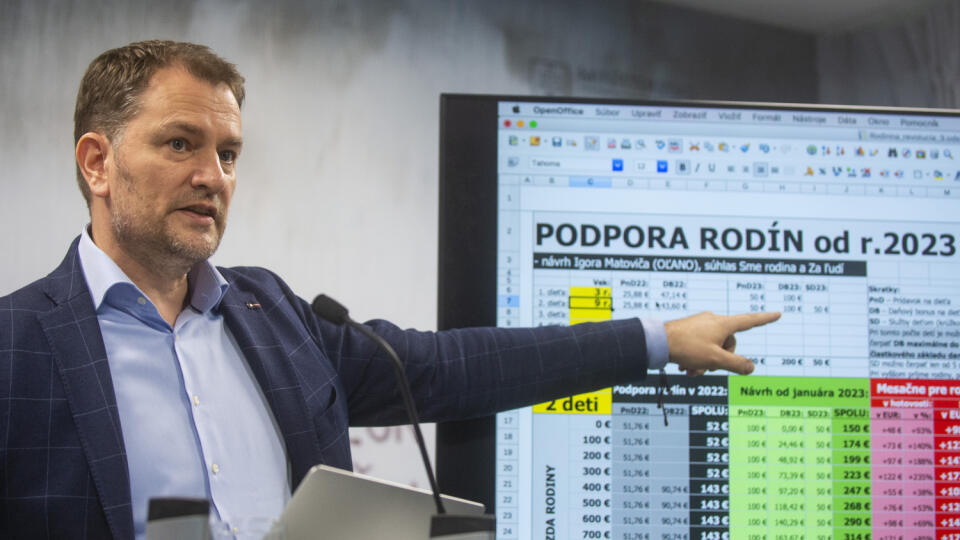Finance Minister Igor Matovič has found himself, not for the first time, in hot water this week.
The Members of the Slovak Parliament have approved measures to help families with the cost of living crisis proposed by Matovič. These measures will mean that children aged 5-18 years will get a financial contribution of 60 euros for their leisure activities, and child allowance will increase as well as child tax bonus.
According to TREND’s survey of 63 selected personalities of the Slovak economy, the majority of them think the measures are purely populistic and will have a negative impact on the country.
After the Minister of Finance said that he wouldn’t be able to draw up the state budget, Minister of Economy Richard Sulík called him incompetent and suggested that if he doesn’t manage that, he should consider a career change.
On top of that, Matovič managed to start a discussion about censoring rainbow flags just as Pride Month begins. He said he approved of the proposal to ban the posting of symbols of movements, organisations, communities, and ideologies promoting any kind of sexual orientation on buildings of state bodies and institutions as well as inside them. The proposal was submitted by Members of the Parliament György Gyimesi from the OĽaNO party and independent Tomáš Taraba.
Andrej Stančík from OĽaNO called the expression of approval by Matovič a violation of the coalition agreement. Even Peter Pellegrini, leader of the non-parliamentary party Voice – Social Democracy, said the proposal has no place in the Parliament and asked whether the country didn’t have bigger problems than whether someone waves a rainbow flag as a show of support.
Prime Minister Eduard Heger called on Gyimesi to withdraw the proposal as the country doesn’t need more polarisation, which the discussion would no doubt cause.
EU grants Slovakia an exception in importing Russian oil
On Monday and Tuesday, the European Union held a summit in Brussels. One of the outcomes was the EU-wide ban on most Russian oil imports by the end of 2022. The agreement affects oil transported by sea, although Poland and Germany pledged to ban imports through pipelines too.
Heger, who was present at the negotiations, said the outcome is good news for Slovakia, as the country has been granted an exemption and will be able to use Russian oil until it has found a sufficient alternative.
The agreement also provides for emergency situations in case of a pipeline disruption of oil supply. If that happens, import by sea will be allowed – a clause that is particularly important for Slovakia and Hungary.
More than 75% of Russian oil is supposed to be affected immediately and by the end of the year, it should be up to 90%. There should be further negotiations about the remaining 10%, most of which flows to Slovakia, Hungary, and the Czech Republic through the pipeline Druzhba.
In the meantime, the prices of petrol in Slovakia are rising. The price of Natural 95 petrol rose to record 1.8 euros per litre last week. And while the sum is as high as in Austria and the Czech Republic, and lower than in Germany, the relatively low Slovak incomes mean that petrol is less affordable for Slovaks.
Counting with the current prices, a Slovak can fill their 55-litre tank for about 100 euros, which is 11% of the average monthly income before tax.
The country is also trying to diversify its gas portfolio and end its dependency on Russian gas. The Slovak Gas Industry (SPP), the state-owned energy supplier, is taking leaps toward diversification in supply. Soon, the company will be able to choose between three sources of natural gas – Russian, Norwegian, and liquified natural gas (LNG). The new supply chains are no more costly than the Russian one, but they could reduce the dependency on Russian gas from 60-70% to 30%.
Other stories of the week
- On Tuesday, President Zuzana Čaputová visited Ukraine to meet with President Volodymyr Zelenskyy and speak in front of the Ukrainian Parliament. She said Ukraine belongs to the European Union and that she would do everything she could to make it happen.
- Prime Minister Heger said that Slovakia wants and needs Ukrainian doctors and nurses, as the country lacks its own. He praised the new changes in the law that make it easier and faster for Ukrainian doctors and nurses to find a job here.
- The Ministry of the Interior should launch a new system of natural disaster warning this June. It will include sending text messages, sirens, and media information.
- Recent statistics show that Slovakia suffers from a lack of teachers and it’s only about to get worse. Compared to last year, schools will lack 1,300 teachers this year, and this number will grow to almost 8,600 by 2025.
Thank you for reading.
See you next week.






